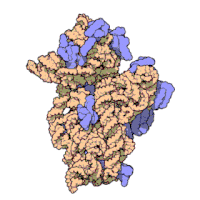
Photo from wikipedia
Abstract Food fraud encompasses economic fraud and can produce health problems for consumers, as well as conservation problems for the involved species. Nevertheless, few studies tested for mislabeling in restaurants.… Click to show full abstract
Abstract Food fraud encompasses economic fraud and can produce health problems for consumers, as well as conservation problems for the involved species. Nevertheless, few studies tested for mislabeling in restaurants. In this study, we tested for mislabeling of fish species in restaurants. We sampled 77 fish dishes from 53 different restaurants located in 9 different districts of Madrid, Spain. A short fragment of the 16S rDNA was employed for DNA amplification leading to species or genera identification. Results showed that 7 species or genera and almost 30% of the samples were mislabeled. Mislabeling was present in 37% of the sampled restaurants and in 71% of the sampled districts. Mislabeling was common and it was not correlated with a districts’ economic status (i.e. with the official average square-meter price of apartments). The analyses also showed that some species were more prone to be mislabeled than others.
Journal Title: Food Control
Year Published: 2019
Link to full text (if available)
Share on Social Media: Sign Up to like & get
recommendations!